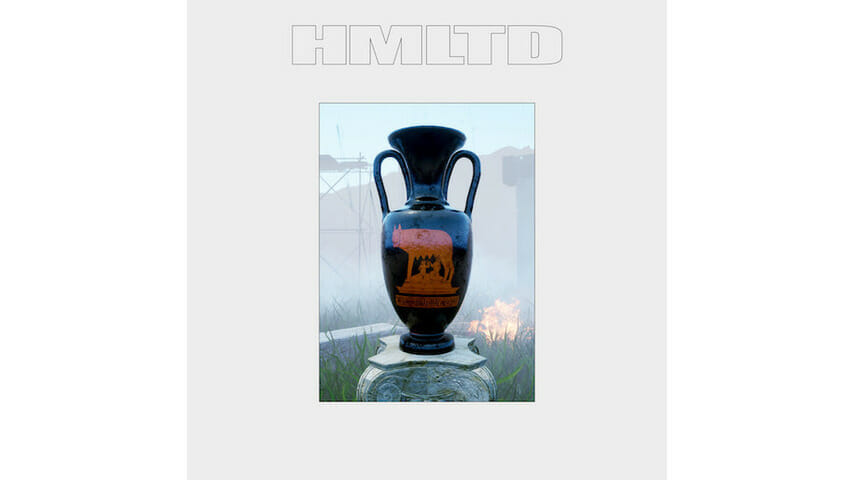HMLTD’s West of Eden Is an Ambitious Depiction of Humanity’s Downfall
After a several-year wait, the London six-piece delivers a theatrical, forward-thinking debut
Music Reviews HMLTD
It’s unusual for a band to fall from grace before they release their first album. Three or four years ago, HMLTD were hailed as London’s next great band. In fact, they were far more subversive and innovative than most of the city’s much-hyped groups. Their infamous headline shows featured dramatic glam costumes, sets designed by the band and props like rubber chickens, mannequins and snakes. Whether you thought their experimental concoction of trap, synth-punk and electro-pop was the greatest thing you’ve heard in ages or overblown nonsense, this wasn’t a band you could ignore.
The androgynous six-piece released a few tracks in 2016, but their breakthrough came in 2017 with their single “To the Door,” perhaps the only successful fusion of trap, Spaghetti Western and punk to date. When their gorgeous, theatrical follow-up single “Satan, Luella, And I” arrived later that year, it sealed their fate as the most exciting band in the country. They eventually signed to Sony, and unsurprisingly, as a band with such a hands-on, fierce devotion to their artistry, the wheels started to fall off. Heaps of cash were wasted on music that was never released, and they spent years trying to get out of their contract. As this was happening, other buzz bands took their place, and their media hype had largely dissolved.
Timing is crucial to a band’s ascent to stardom, and although HMLTD fell victim to the hourglass, their debut album, West of Eden, has finally arrived via indie label Lucky Number. As they experienced their own fall from grace—according to the band, no less—so has modern Western civilization, which serves as the backdrop of West of Eden. Karl Marx once posited that capitalism would “sow the seeds of its own destruction,” and HMLTD apply this theory not just to late capitalism, but to masculinity as well, which cannot be divorced from imperialist hegemony—itself a patriarchal structure.
On lead track “The West is Dead,” we learn that our narrator is not merely a product of a grim Western setting, he also is the setting: Frontman Henry Spychalski proclaims over a thumping bassline and chaotic synths, “I am the West, and the West is dead!” He imagines a world that isn’t just falling apart via environmental ruin and reckless greed, but a hellish one where everyone lives and dies by the seven deadly sins, even the Dalai Lama. “LOADED” describes an economic free-for-all that incentivizes desperate lower classes to become just as bloodthirsty as the ruling class: “I sold my soul to the devil tonight / And I’m / Still pretty fucking poor / But my / Gun is fucking loaded.”
“To The Door” and “Satan, Luella & I” both reappear here in their original glory, and their grapples with existential moral crises fit nicely alongside the album’s broader narrative. The most glaring inclusion is “Why?” with its Japanese lyrics and Vocaloid-style vocals, but when nestled alongside the unconventional synth-punk of “149” in the middle of the album, it functions much like the bizarre mid-song interlude of “To The Door”—a swap of their punk leanings for experimental electronics that are so left-field they’re bound to alienate some listeners.
HMLTD move their focus from greed and loneliness on side one to toxic masculinity on side two. We’re introduced to femininity on “Joanna,” which opens with music box twinkles, an allusion to the innocence and feminine presence inside us as infants. After a concerted external effort, Joanna is targeted and later bludgeoned on the subsequent “Where’s Joanna?” At this point, it appears the first 12 songs are deliberate pairs of six—the first pair sets the scene, the next depicts a devil and his lover comfortably hidden away from peasants, the third questions what love should look like in such a vain world, the fourth depicts two outcomes of patriarchal systems (loneliness and violence), the fifth deals the fatal blow to a healthy version of masculinity and the sixth has just about ensured the auto-cannibalism of civilization.
Fittingly, after those six pairs, we’re met with the album’s first triumphant number “Blank Slate.” It’s unclear whether “Blank State” depicts a post-rebellion utopia or if our lead character has been through a hellish dream this whole time and now realizes his second chance to prevent the fall of humanity. But final track “War is Looming” crushes both of these potential realities with the most cruel and epic ending possible—a cataclysmic, world-ending war. Crucially, the album’s final line sums up the pitfalls of unrelenting decadence: “All we ever want and ever were, is lost in time.”
West of Eden attempts to distill humanity’s evil into its most essential properties, painting a picture of the “ouroboros,” the snake eating its tail, on both an individual and structural level. Aided by the use of characters, allegories and biblical references, West of Eden is an ambitious concept album whose analyses of socio-political, cultural and personal turmoil are directed towards long-upheld structures. Their intelligent use of storytelling devices and century-spanning reference points prevent this from falling under the umbrella of typical political punk. Its musical thread might be occasionally mangled, tapping into synth-punk, J-pop, Britpop, electro-pop and psychobilly, but Henry Spychalski’s theatrical presence and the band’s forward-thinking oddities are positively hypnotic. Despite the high barrier to entry, West of Eden crowns HMLTD as one of few bands with a serious claim to artistic vision and sonic uniqueness.